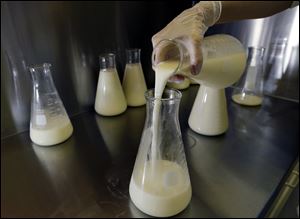
Banks for breast milk a good investment
9/3/2012
Kelly Fischl, a lab technician at the Mothers' Milk Bank of New England in Newtonville, Mass., pours donated breast milk into another flask to prepare for pasteurization. Pathogens are removed in the process, so the milk can then be distributed to babies in need. However, there doesn't seem to be enough donor milk to send to hospitals to give to babies who badly need it.
Got milk for your baby?
Breast milk, that is? Because after all, whether yours is a full-term, premature, ill, or healthy newborn, the experts say that mother's breast milk is best for the child.
Sometimes, though, new moms don't lactate soon enough after their babies are born to breast feed them. In those cases, the lactation experts say that donor human breast milk is the preferred option for babies. However, there doesn't seem to be enough donor milk to send to hospitals to give to babies who badly need it.
"For the last six months [milk banks] have been struggling with national shortages and can't fill all of our orders," said Fran Feehan, director of the Mothers' Milk Bank of Ohio at Grant Medical Center in Columbus.
Among the reasons that the demand is not being met is because not enough lactating women are donating their breast milk and because there are only a dozen milk banks in North America: 10 in the United States and two in Canada.
Human donor milk banks like the one in Ohio receive, process, store, and distribute the milk to hospitals. The MMBO, established in 2005, sells breast milk to a couple hundred hospitals nationwide, including Toledo Children's Hospital and Mercy St. Vincent Medical Center, and to Canadian hospitals.
While policies vary, Ms. Feehan said some hospitals may give the milk only to premature and sick infants while others give it to full-term healthy babies whose mothers are not yet lactating. That's a benefit Helen Wild, lactation consultant at Mercy St. Vincent Medical Center, addressed.
"Babies who are very small, or premature babies, who are [3.3 pounds] get the donated milk for two weeks or until the mom is able to provide the milk herself," Ms. Wild said. "We want all babies to get their own mother's milk, and if she can't provide it, then they will have donor breast milk."
Ms. Feehan added that donor human breast milk is easy for babies to absorb and digest.
"It's the best practice to have donor human milk for sick and premature babies. It's the best source of nutrition," she said. It "has a lot of immune boosting properties in it, so it helps to build their own antibodies, and it has a perfect balance of protein, fat, and calories for newborn babies."
Women whose babies did not survive may also want to donate their milk as a part of the healing process.
"That's about 8 percent of our population," Ms. Feehan said about bereaved mothers. "The rest comes from healthy lactating moms who produce more than their babies need or handle and who have a stock pile in their freezer. So as they are nursing their own babies, they are pumping extra milk for us."
Potential donor mothers endure a rigorous process. Those who pass an initial telephone interview with a registered nurse are sent a packet with questions about their health history. A blood specimen is obtained and tested for such problems as HIV, hepatitis, illegal drugs, and alcohol. Moreover, a mother's OB-GYN and her baby's pediatrician must sign off too.
"We want to make sure we are delivering a safe milk supply," Ms. Feehan said.
MMBO sends mothers containers for the milk and shipping containers in which to return it. The bank pays shipping costs. Donor moms are not compensated.
"Moms don't have to use our containers," she said. "Some moms use little plastic bags that you [buy]. One mother sent a couple of dozen small glass canning jars."
Milk is processed and pasteurized to kill any bacteria that might be present. It is then put into containers, refrozen, and sold and shipped to hospitals.
Just as if a doctor would write a prescription for medication, a prescription must be written by a physician for a hospitalized child to receive human donor breast milk. A family's insurance is billed the same as it would be billed for medication.
Though breast feeding has been on the rise, Ms. Feehan said even more mothers need to breast feed, especially poor and African-American women. The refusal to breast feed is not solely specific to those groups, however, as Ms. Feehan knows a physician and a nurse who think of breast feeding as "yucky."
Ironically, some women view breast feeding as something for poor people. For others, it's a matter of inconvenience. Women going back to work may not have a private place to pump milk or store it.
While in Ohio a team of lactation consultants are working to increase breast feeding among Women, Infants, and Children moms, U.S. Surgeon General Regina M. Benjamin's Call to Action to Support Breastfeeding is at work on the national front.
The research speaks for itself: "Breast feeding [is] the best option for your baby," Ms. Feehan said. "That is what we are trying to promote."
Contact Rose Russell at rrussell@theblade.com or 419-724-6178.